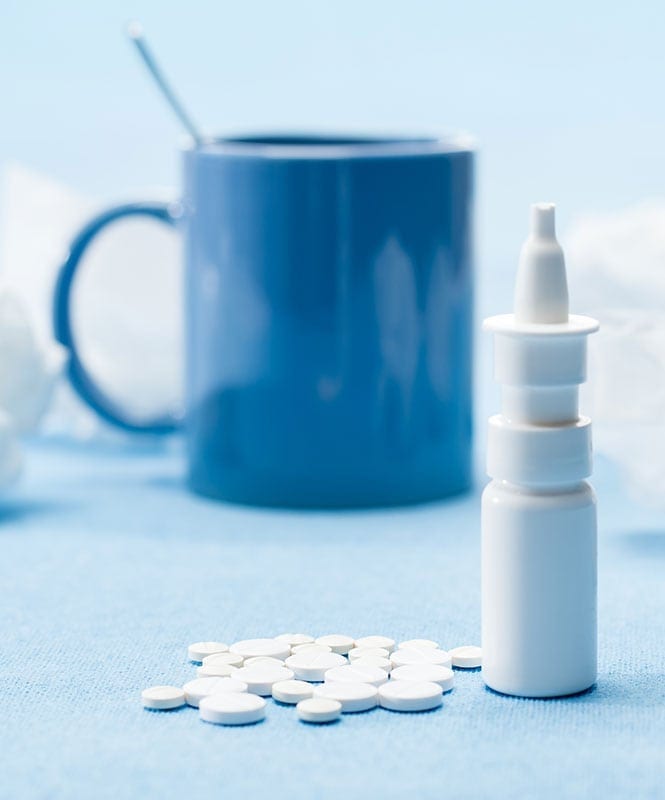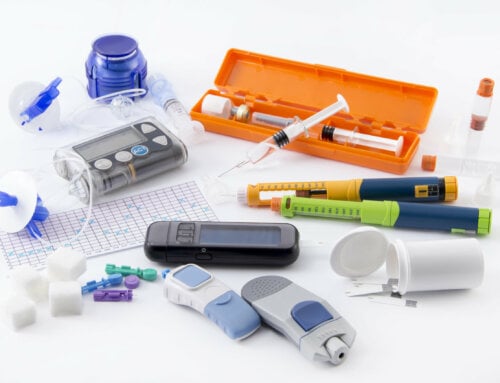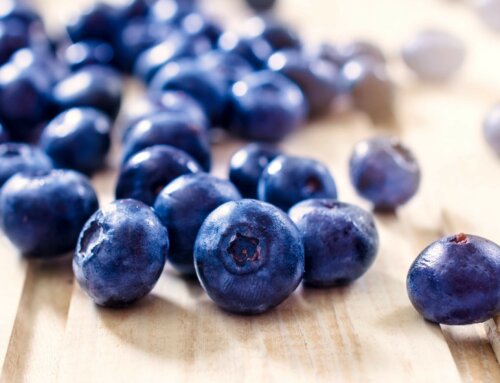Welcome to spring time which brings a change in the weather for all of us, but for too many people the suffering of seasonal allergies accompanies the change. “Allergies arise when the immune system overreacts to an otherwise harmless substance known as allergens caused by pollen, weeds, mold, grass, trees, dust mites, cockroaches, pet dander, foods, dyes, wine and cosmetics.” Allergy sufferers may have a dry cough, itchy and watering eyes, a sore, scratchy throat, stuffy or running nose with sneezing, dark circles beneath the eyes and an abundance of throat clearing. Severe allergies can result in hives, rashes, breathing trouble, asthma and changes in blood pressure. According to The Asthma, Allergy Foundation of America, “50 million Americans are affected by nasal allergies. Allergies are the 6th leading cause of chronic illness in the US.” Allergies can begin at any stage of life including adulthood. The milder the weather during the winter, the earlier seasonal allergies begin. It is difficult for anyone to deal with allergies but people with diabetes need to be extra careful and conscientious since allergies can affect blood sugar levels and ultimately blood sugar control.
Always make sure you do not have a cold, flu or respiratory infection since symptoms may mimic allergies. After allergies have been diagnosed, “hay fever, allergic rhinitis”, you can take a more specific action plan. Pollen is the biggest offender and cause of allergies in the US along with mold from damp grass, trees and mulch. Allergy symptoms do not directly raise blood sugars. Discover how spring allergies may lead to elevated blood sugars and what you can do to prevent problems.
Tips to Help Spring Allergies:
- Shower Time: Learn to shower immediately after being outside to remove pollen from your skin and hair. On a particularly windy day, it is a good idea to add a quick evening rinse to ‘de-pollenate’ from the day since pollen particles can stick to you all day. This will hopefully allow for more restful sleep and less allergy symptoms.
- Hair Products: Gels, sprays, mousses and oils can make pollen stick to your hair and face throughout the day. This will make you more symptomatic especially on high pollen days. Ditch the hair products and wear a hat instead. Wash hair frequently with a simple shampoo or just rinse daily with water and apply a light cream rinse to keep hair tame.
- Glasses or Contact Lenses: Contact lens wearers complain more about eye irritation and watery eyes than glass wearers during allergy season. Pollen can stick to the contacts and irritate the surface of your eye. Wearing glasses can act as a physical barrier between you and the pollen. If you prefer contacts, then go with the kind you change daily which won’t accumulate pollen. For those who do not wear regular glasses put on some sunglasses for extra eye protection.
- Close the Windows: Although you may prefer fresh air especially when spring weather arrives, you will be letting piles of pollen indoors. Close the windows and crank on the AC. Make it a priority to keep up with filter changes on a regular basis. Consider calling in an AC company and getting all the air vents, for both heating and cooling, vacuumed out. Also think about adding a new home filtration system.
- Car Travel Instead of getting fresh air by opening the windows, use air-conditioning in the car when you suffer from allergies. Use the recirculation button to keep pollution out and help cool the car AC more quickly.
- Walking Outdoors Grass, weeds and trees pollinate more in the early morning hours so if you decide to walk outside do it in the evening hours. “Pollen counts tend to run highest between 5:00-10:00AM.” Wear a face mask on days when the pollen count is at its highest. You can check for pollen counts on TV, in the newspaper or on the internet. The most common pollen allergies are to oak, grass, birch and ragweed. Consider indoor exercise options like a treadmill, stationery bike, DVD, or yoga class on high pollen days. Even outdoor swimming pools can get a blast of pollen on windy days.
- Animals: Wash dogs frequently and brush dogs and cats daily to lower dander.
- No Smoking: Smoking is just plain bad for you and will increase allergy symptoms and problems, too.
Blood Sugar, Allergies and Medicine
OTC Allergy Medicine
Many OTC sprays, syrups, chewables, capsules and pills are loaded with sugar, artificial colors and artificial flavors. Cough drops and drops to soothe throat irritation may contain sugar, so read labels carefully because there are many names for sugar. Check labels for sugar-free, blood pressure-friendly allergy medicine that will help control your symptoms. There are name brand products followed by generic brands which will help do the trick. Experts recommend starting OTC allergy medications two weeks before you expect seasonal misery to set in, so start early.
Anti-histamines
“Histamines are chemicals made by your immune system. They help your body get rid of a specific trigger such as an allergen-pollen that bothers you and are part of the body’s defense.” Histamines generally over-react to the allergen whether it is food, alcohol, pollen, grass, weeds, mold or dander. Anti-histamines are used specifically to treat nasal congestion, runny nose, sneezing, irritated throat, hives or runny, itchy eyes. They should be used on a “needed basis” since too many anti-histamines can dry you out making it impossible for you to drain and then create more misery. Common antihistamines are Benadryl, Claritin, Allegra and Zyrtec. Benadryl is an older antihistamine with side effects of extreme drowsiness, blurry vision, dry mouth and urinary retention, especially in older adults. Avoid Benadryl with diabetes unless recommended by your physician. People have fallen asleep and missed a meal causing hypoglycemia or low blood sugars. Avoid anti-histamines when taking sleeping pills, tri-cyclic anti-depressants and drinking alcohol.
Decongestants

Corticosteroids and Prescription Nasal Spray
Prednisone pills or nasal spray may be prescribed to reduce inflammation. Steroids cause the liver to increase glucose production which leads to elevated blood sugars. Follow up with your physician to find out the risks and benefits of these medications. Make sure you test your blood sugars at home with a glucose meter often to see if these products raise them. Examples would be Flonase, Nasonex and Nasacort. Check with your physician to see if you need to change insulin doses when taking steroids.
Eye Drops
Eye drops are used to flush out pollen, reduce itching, redness, swelling and keep the eyes moist during allergy season. Try Visine A or talk to your optometrist or ophthalmologist for the best choice. Some eye drops do contain steroids, which could raise blood sugars.
Cromolyn Sodium
Stuffy noses and watery eyes associated with allergies may benefit from eye drops and nasal sprays containing Cromolyn Sodium. This ingredient is a mast cell stabilizer that helps prevent the release of histamines during allergic reactions. It is derived from an herb and considered a “second or third line of defense for allergies.” Nasalcrom, comes in a solution and should be taken 3-6 times a day before exposure to an allergen. Consult your physician prior to trying this remedy.
Allergy Shots
If spring allergies continue to be a significant problem, you may need allergy testing followed by allergy shots. According to experts, “allergy shots can be a slow fix taking from six months to one full year to see reliable effects.” Talk to an allergist to find out details.
Alternatives to Allergy Medicine
Other remedies can be used in place of medications after discussion with your physician. Nasal irrigation is an effective way to relieve congestion and spring allergy symptoms. You can use Neti-pots, saline nasal spray, nose bidets, bulb syringes, squirt bottles or pulsatile irrigation systems. Nasal rinses thin out mucus which will give you instant relief. It is suggested you use “generic sterile rinses” in these devices as opposed to tap water which may cause an infection.” Nasal strips may widen the nasal passage and give you “up to 30% more air.” These non-drug interventions can alleviate congestion associated with spring allergies.
Herbal remedies. You can find a bunch of herbs which may treat allergy symptoms but be aware that they may raise blood sugars. They are not regulated by the FDA. Never try an herbal remedy unless first discussed with a professional.
Foods and Drinks

Hydration: Staying super hydrated is one of the easiest and is a drug-free ways to thin out mucus and make you feel better instantly. Try to stick to plain water for the best results. Sugary juices, energy drinks, soda and most sport drinks will just raise blood sugars.
Allergy season is upon us now that spring is here. People with diabetes need to be extra cautious when treating allergies since certain remedies may raise blood sugars. Enjoy your spring without allergy and blood sugar problems by learning what to do!
Have a question or comment? Then post below, no registration required. I would love to hear from you!
NOTE: Consult your Doctor first to make sure my recommendations fit your special health needs.







Roberta, I am peruvian and live in Lima, very humid city. Have been a diabetic under insulin for the past 60 years. Now 68 yrs and with Dexcom G6, Tresiba and Novorapid.
In some times of the year, I have rhinitis which affects my blood sugar. After allergy test, nothing was found. Treat my rhinitis with Neti Pot and Vicks sinus steam inhaler. Sometimes use Azelastine and take Aerius 5mg.
What can I do to treat rhinitis and control blood sugar? Thanks for your response.